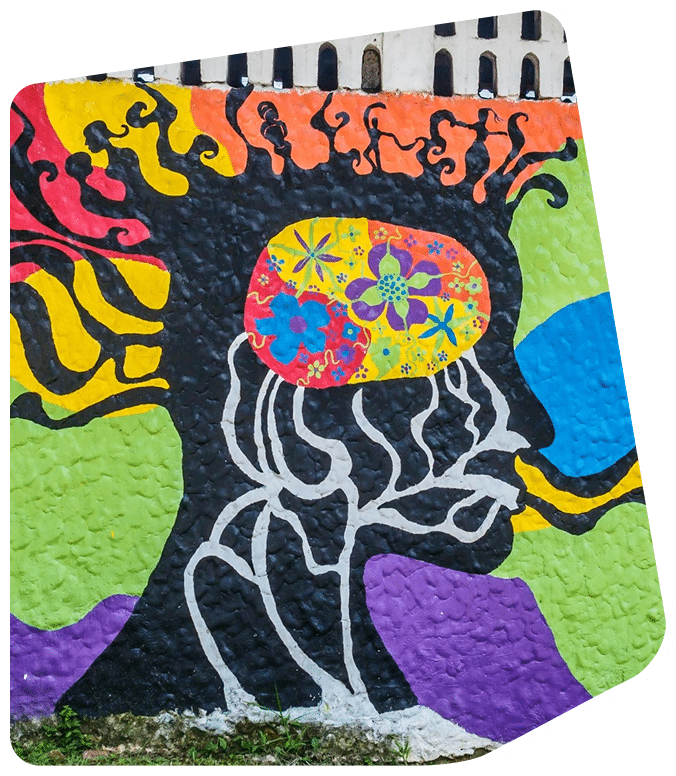
I help highly sensitive, often neurodivergent adults let go of shame through compassionate, no-BS online therapy that supports how their brains actually work.
Have you been called “too sensitive” so many times you’ve become numb (or wish you could be)? Maybe you’ve heard: “Just grow a thicker skin.” (Eyeroll.)
Many people who experience the world intensely come to me saying things like:
If any of this rings a bell, you may be an “orchid.”
We’re all wired differently. Sensitivity lives on a spectrum, and you’re not on the “wrong” end of it. There is no “right” or “wrong” way to be. There’s just how you are. And here’s the secret: there’s nothing wrong with being sensitive.

At one end of the human sensitivity spectrum are dandelions. Give them a little sun and rain and they’ll grow just about anywhere into a perfectly lovely yellow flower. At the other end are orchids. They need very specific conditions to thrive. But when they get what they need, they bloom in spectacular ways.
You’re not broken. You’re an orchid.
About 15–20% of people are orchids, wired to be more sensitive to their surroundings, emotions, and internal rhythms. Many (though not all) are also neurodivergent (ADHD, autism, dyslexia, sensory issues, etc.). If you’ve spent your life trying to adapt to environments that weren’t built for you, it makes sense that you’re exhausted.

Being an orchid means you feel more, sense more, and respond more deeply to the world around you. That can be painful. But it also opens the door to creativity, connection, and depth.
Even if you didn’t grow up in the right conditions, it’s not too late to create them for yourself now.
You can stop apologizing for who you are. You don’t need to be “fixed.”
With the right tools and context, you can stop feeling like too much… and start feeling like yourself.
We’ll explore how your sensitivity affects your life, relationships, and self-worth. Together, we’ll look at masking, executive functioning, shame, substance use, or whatever’s coming up for you.
We’ll go at your pace and lead with curiosity.
Support should meet you where you actually are.
We figure out how you work and build support around that. When therapy matches your nervous system, change starts to feel possible.
All you need to do is show up, “ready” or not.
If your sensitivity feels like a problem, it may be because it wasn’t seen or supported when you were growing up.
Orchids need specific conditions to thrive. But many sensitive people grow up in environments that invalidate their needs, whether on purpose or not, so they learn to adapt.
Invalidation can look like:


If you’re also neurodivergent (e.g. ADHD, autism, learning disabilities, etc.), your nervous system may react more strongly or differently to the world around you. This can include:
It wasn’t your wiring that caused the pain. It was the misunderstanding around it.
Maybe you were labeled difficult. Maybe you were praised for “keeping it together” but quietly fell apart. Without support, you learned to mask, shrink, or to feel ashamed.
Therapy can help you shift that. You may not have received what you needed back then, but you can give it to yourself now.
You are not too much. You were never the problem.
You Might Be an Orchid If...
And You’ve Learned To...

You might appear successful while privately managing stress like it’s a second job. On the outside, you may be competence personified. Inside, you’re juggling anxiety, overstimulation, and the pressure to prove your worth.
You might:
You’ve been surviving in conditions that never worked for you. You’ve spent years holding yourself together in places that misunderstood your wiring.
Sounds exhausting. Wanna talk about it?
You love deeply. You feel a lot. You pick up on things others miss. But if your intensity was ever called “too much,” you may have started shrinking just to keep the peace.
In relationships, you might:
You may tell yourself you are “clingy” or “overdramatic. In reality, you’re just searching for emotional safety (which in itself is a hallmark of a healthy relationship).

If your sensitivity was treated like a problem, you might have learned to hide yourself. To wear masks. To adapt. And somewhere along the way, you may have lost track of what’s real.
You might doubt your instincts, or equate needs with weakness. You may feel like no version of you is quite right.
Therapy can help you come home to yourself.
Let’s reclaim the self you buried to survive. Let’s find ways to help your sensitivity breathe.
Here’s a short exercise to try at home. It helps you get some distance from your shame without denying, fighting, or silencing it. Just make space to hear it and decide whether it’s worth listening to. We know that yelling at it doesn’t work, but neither does pretending it’s not there.
Naming it gives you perspective… and takes away some of its power.
It goes like this:
Step 1: Write down your shame voice’s greatest hits.
Stuff like:
Step 2: Give that voice a name. It can be The Critic. Jerkface. Harold. Whatever fits.
Step 3: Try saying: “Thanks for your opinion, [Harold]. I hear you. But I’ve got this right now.”

We start from wherever you are. We work as a team. You bring your lived experience. I bring tools that fit your needs and pacing (with very little nod-and-smiling or stroking my pretend beard).
I offer strategies that meet your nervous system with compassion.
That includes executive functioning support, and therapy approaches like Internal Family Systems (IFS), Dialectical Behavior Therapy (DBT), cognitive behavioral therapy (CBT), harm reduction, and psychodynamic therapy.
But honestly? The most important part is this: I listen without judgment or asking you to be someone you’re not.
You don’t have to know what to say. You don’t even have to want to talk. You just have to show up.
We’ll figure the rest out together.
Let’s work together to value your inner orchid, your neurodivergence, your sensitivity, your… self. It’s time for support that honors your wiring.

Book A Consult